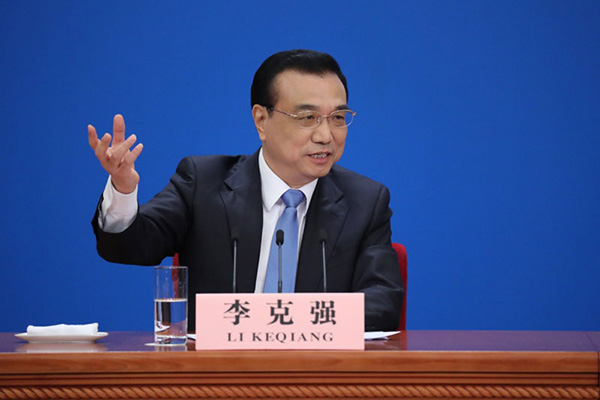
Several international agencies, including Goldman Sachs, Bloomberg and Reuters, are optimistic about China’s economy, echoing Premier Li Keqiang’s comments at this year’s two sessions.
“China’s economic performance in the past few years should suffice to put predictions of a hard landing to a full stop ... China will remain an important engine for world growth amid a sluggish global economic recovery,” Premier Li said when answering reporters’ questions at a news conference during this year’s two sessions.
The latest OECD Economic Survey of China published on March 21 said the growth of the Chinese economy remains high. A stable employment market and people’s rising incomes are boosting consumption, which replaces investment as the main economic driver.
In fact, employment is always one of Premier Li’s top concerns. He has emphasized many times that employment is the foundation of people’s lives and the barometer of the economy. For four consecutive years, the Chinese government has created more than 13 million jobs.
In addition, the OECD mentioned supply-side reform, innovation and value-added-tax reform. It said that VAT reform has been upgrading the Chinese tax system and easing some burdens on enterprises. Data shows that VAT reform in 2016 has cut the tax by 570 billion yuan ($82.8 billion).
Another reason behind China’s economic growth, according to the OECD’s report, is the campaign to cut hundreds of administrative approvals by the Chinese government, which has improved business environment and lifted the burden on startups.
“China will be the main force that promotes global economic growth,” the OECD report said.
Bloomberg concluded that China’s economic engine is getting stronger, not only in traditional industries, as China’s steel confidence index increased from 25.21 in February to 49.19 in March, according to S&P Global Platts; but also high-end manufacturing, as the satellite manufacturing index increased from 51.1 in February to 51.8 in March. All these indicate that new engines are driving China’s economic transformation and upgrading.
Meanwhile, small and medium-sized enterprises are optimistic about China’s economic growth. According to Standard Chartered Bank, Chinese small and medium-sized enterprises’ confidence index rebounded to 60, the highest in the last two years, while World Economics announced that Chinese sales managers’ confidence index accelerated to 52.2, a high point in the past 20 months, reflecting a growing demand.
A survey conducted by the Centre for European Economic Research and Fudan University showed that financial market experts worldwide think China’s economy demonstrates good prospects, as the expectation index soared to 14.5 in March from -4.2 in February, Bloomberg News said.
Surveys by Reuters showed China’s increasingly stable and positive economic performance also restored confidence in the Asian economy.
The survey of 96 enterprises in the Asian region in March found the Asian Business Sentiment Index rose to 70 in the first quarter from 63 in the last quarter, hitting its highest level in two years.
Over half of the enterprises surveyed remain optimistic about prospects in the next six months. Most of them said China, as the largest export destination for Asian enterprises, has done a good job, according to its recent economic data that beat market expectations.
Some enterprises said Chinese consumers’ demand for high-quality products and services builds their confidence in the upcoming six years.
